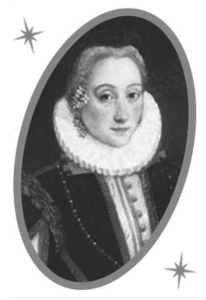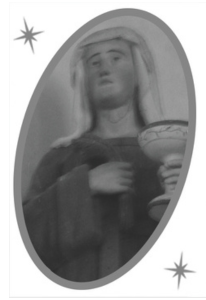Well, folks, we've run out of letters of the alphabet. So for the remainder of the Round of 32 we'll be catching some ZZZZs with the next three battles pitting Z vs. Z. We kick things off with Katharina Zell taking on Zenaida. Reformer vs. early Christian.
On Friday, in a hotly contested battle, Zechariah snuck past Yvette of Huy 52% to 48% to advance to the Saintly Sixteen.
Look for a BRAND NEW Monday Madness video from Christian and Michael later today. And in the meantime...
Vote now!
Katharina Zell
 Sure, you’ve heard of Martin Luther. You might have even heard of Philip Melanchthon, Martin Bucer, or Johannes Bugenhagen.
Sure, you’ve heard of Martin Luther. You might have even heard of Philip Melanchthon, Martin Bucer, or Johannes Bugenhagen.
But what about Katharina Schütz Zell?
Nicknamed the “Mother Reformer,” Katharina was one of the most prominent women of the Protestant Reformation, a prolific writer, and one of the first and most daring models of the pastor’s wife.
She was born around 1498 in Strasbourg, in what is now France, where she lived her whole life and attended St. Lawrence Cathedral. A year after Luther nailed his 95 Theses to the Castle Church door in Wittenberg, Germany, a new pastor named Matthew Zell took charge of the cathedral and began sharing Luther’s teachings. Katharina not only adopted those teachings; she married the pastor.
This was a controversial move, coming years before Luther himself married. Newlyminted Protestants believed clergy were free to marry—in theory. But to do so was heretical in the Catholic Church, and there were no examples to look to.
The Zells’ marriage was a remarkably equal partnership at a time when wives were expected to be silent and obedient. (The Protestant Reformation didn’t change everything.) Katharina viewed it as a vocation. Scholar Elsie McKee writes, “Katharina Schütz was convinced that she was called to marry Matthew Zell as an expression of her faith in God and her love for others.” The couple had two children, both of whom died very young.
Katharina’s vocation also included hosting prominent Reformers and other Protestant refugees forced to flee religious persecution, and writing pamphlets essential in spreading the Reformers’ message. Her best-known work was an open letter– turned–pamphlet titled “Defending Clerical Marriage.”
Luther was personally familiar with Katharina’s writing. Bucer called her “as Godfearing and courageous as a hero,” and Huldrych Zwingli said of her, “She combines the graces of both Mary and Martha.”
But not everybody admired her outspokenness, and the pastor who succeeded her husband in Strasbourg derided her as a “disturber of the peace of the church.” Katharina wrote, “I am convinced that if I agreed with our preachers in everything I would be called the most pious and knowledgeable woman born in Germany. But since I disagree I am called an arrogant person and, as many say (perjoratively), Doctor Katharina.”
The Mother Reformer died on September 5, 1562, and The Episcopal Church remembers her on the day of her death.
Collect for Katharina Zell
Almighty God, whose servant Katharina Zell toiled for the reform of your church both in word and in deed: Fill us with the wisdom to speak out in defense of your truth, with love for you and for our neighbor, that we may serve you and welcome all your people with a mother’s heart; through Christ our Lord. Amen.
Zenaida
 Zenaida and her sister Philonella are honored on April 14 as the first Christian physicians to practice after Luke the Evangelist. Together with Hermione, the three women claim the title, “The Mothers of Modern Medicine.” Zenaida’s story is one of self-determination, collaboration, and pious generosity.
Zenaida and her sister Philonella are honored on April 14 as the first Christian physicians to practice after Luke the Evangelist. Together with Hermione, the three women claim the title, “The Mothers of Modern Medicine.” Zenaida’s story is one of self-determination, collaboration, and pious generosity.
Zenaida and her sister were born in first-century Tarsus to a well-educated Jewish family. The two sisters pursued education in philosophy and medicine in their hometown. Their cousin Paul was an Apostle, and their brother Jason was the first local bishop, evidence of strong familial call to follow Jesus. At some point, both sisters converted to the Christian faith and were baptized. Zenaida and her sister used the blessing of their education to bless others.
In nearby Thessaly, there was a hot spring known for its healing properties. Pagan adherents had established many shrines there to Asclepius, the god of healing. People in search of healing traveled to the area to pay for medical interventions and buy magical amulets and charms. Due to the high cost of care, most visitors to the area were wealthy. Zenaida and her sister packed up their lives and moved permanently to Thessaly to establish a different, more egalitarian kind of healing ministry.
The sisters set up a chapel and medical clinic; there, they offered medical services free of charge to everyone in need. They were the first “unmercenary” saints—doctors who did not accept payment for their services. Instead, they urged their clients to pray in thanksgiving to God. Zenaida specialized in pediatrics and psychiatric healthcare, especially depression. Unlike others in the area, the three women approached their vocation from a counter-culturally scientific angle, striving to separate factual medicine from superstition as best they could. They wove prayer into every aspect of their work, healing not only bodies but also souls.
The two sisters worked together for their entire lives, running their medical center and welcoming all in need. Their ministry attracted travelers from all over the region. Tales abound regarding the ends of their lives, so their fate is shrouded in mystery. Some claim that Zenaida and Philonella suffered martyrdom, being stoned to death by a mob. Others claim that Zenaida lived a long life, dying peacefully before her sister, who carried on their legacy. Still others claim Zenaida died by stepping on a nail.
Regardless of their ends, the sisters’ legacy is profound. To this day, they are venerated as feminist icons in medicine. By subverting the healthcare economics of their time, Zenaida and Philonella offer to modern Christians inspiration for reimagining our own medical systems.
Collect for Zenaida
Merciful God, whose most dear Son came to heal the sick, raise the dead, cast out demons, and preach good news to the poor: Lead us by the example of your servants, Zenaida, Philonella, and Hermione, to freely give even as we have freely received; through Jesus Christ our Lord. Amen.
64 comments on “Katharina Zell vs. Zenaida”
Bummer that I was not able to vote today.
Really tough decision today, which is why I waited until the late evening to cast my vote. Both women are worthy to make it to the Golden Halo. I loved Katharina’s story as a woman who was threatened with the reputation of being a “disturber of the peace of the church.” We need more of those, especially today, and especially women taking a stand against the right-wing hijacking our CHRISTian belief (love your neighbour as yourself). But then there’s Zenaida who believed wholeheartedly in holistic medicine: curing people using proven scientific methods in tandem with spiritual modalities, including prayer. And all for FREE! I was recently in hospital for a week with Covid and double pneumonia. I am grateful for the care and healing I received from the doctors and nurses, the pharmacist and the PSWs. But I am even more grateful for the fact that my care was completely free thanks to universal health care called OHIP in Ontario. The only financial burden my family had to deal with was parking; a total cost for a 10-ticket package was $40. Loving your neighbour means providing care to all, and how a community cares for their most vulnerable. Zenaida’s story is a gentle reminder of the parable of the Good Samaritan. We look after the sick in their time of need in order to create a stronger community. My vote goes to Zenaida, her sister and Hermione.
I voted for Zenaida and companions. Her inspiring work is just too wonderful to ignore
I voted for Zenaida . She was a good physician who with her sisters cared
for the poor.